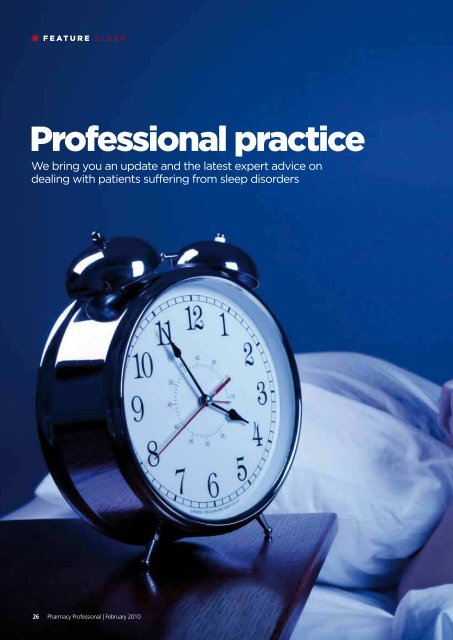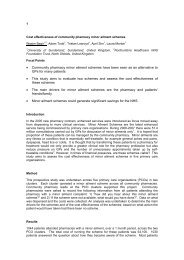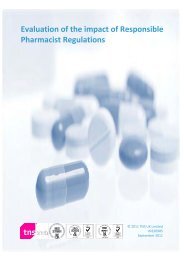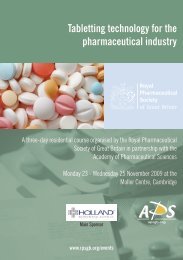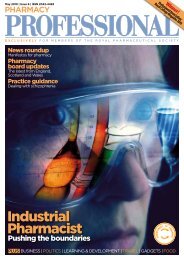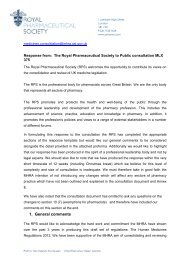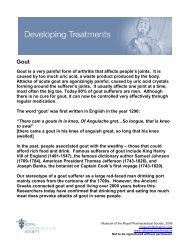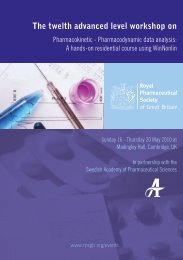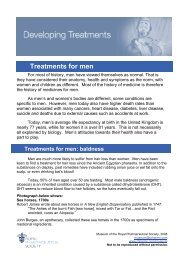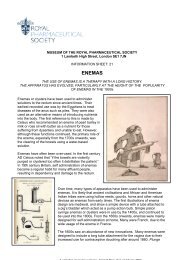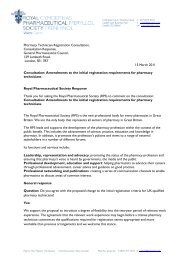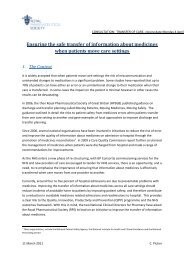Pharmacists in sport - Royal Pharmaceutical Society
Pharmacists in sport - Royal Pharmaceutical Society
Pharmacists in sport - Royal Pharmaceutical Society
Create successful ePaper yourself
Turn your PDF publications into a flip-book with our unique Google optimized e-Paper software.
F E AT U R E S L E E P<br />
PRACTICE GUIDANCE:<br />
PHARMACEUTICAL CARE<br />
IN SLEEP DISORDERS<br />
Professional practice<br />
We br<strong>in</strong>g you an update and the latest expert advice on<br />
deal<strong>in</strong>g with patients suffer<strong>in</strong>g from sleep disorders<br />
GUIDANCE OBJECTIVES<br />
• To ga<strong>in</strong> an understand<strong>in</strong>g of sleep disorders and their<br />
management<br />
• Identify pharmaceutical issues and meet patients’ needs<br />
• Explore and implement pharmaceutical care services for<br />
sleep disorders <strong>in</strong> practice<br />
RPSGB competencies for complet<strong>in</strong>g a CPD entry (see<br />
appendix 6 of “Plan and Record” www.uptodate.org.uk):-<br />
• “mak<strong>in</strong>g sound decisions and solv<strong>in</strong>g problems <strong>in</strong><br />
relation to drug therapy”<br />
• “promot<strong>in</strong>g health and healthy lifestyles”<br />
Background<br />
Sleep is a vital biological process that is necessary to restore<br />
both the body and m<strong>in</strong>d. Most adults need 7 to 8 hours of<br />
sleep each night but this varies greatly between <strong>in</strong>dividuals.<br />
Children and adolescents need to sleep longer (sleep is<br />
important for growth and development); elderly people need<br />
less sleep.<br />
Insomnia (sleeplessness) is the most common sleep<br />
problem. Insomnia is a prolonged <strong>in</strong>ability to obta<strong>in</strong><br />
adequate or un<strong>in</strong>terrupted sleep. Types of <strong>in</strong>somnia are:-<br />
• Transient <strong>in</strong>somnia – lasts a few days and is usually a<br />
result of a stressful situation e.g. an exam or as a result of<br />
an altered sleep rout<strong>in</strong>e e.g. jet lag or shift work.<br />
• Short-term <strong>in</strong>somnia – lasts 1-4 weeks. It is typically due<br />
to emotional trauma or physical illness.<br />
• Chronic <strong>in</strong>somnia – affects about a third of those suffer<strong>in</strong>g<br />
from <strong>in</strong>somnia and lasts more than one month. It is usually<br />
a result of <strong>in</strong>gra<strong>in</strong>ed poor sleep hygiene.<br />
Æ<br />
26 Pharmacy Professional | February 2010<br />
February 2010 | Pharmacy Professional<br />
27


